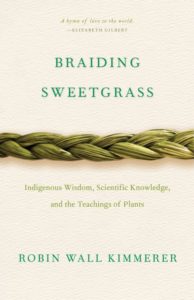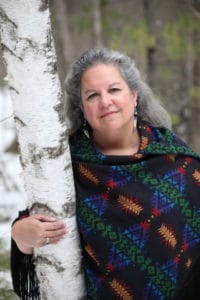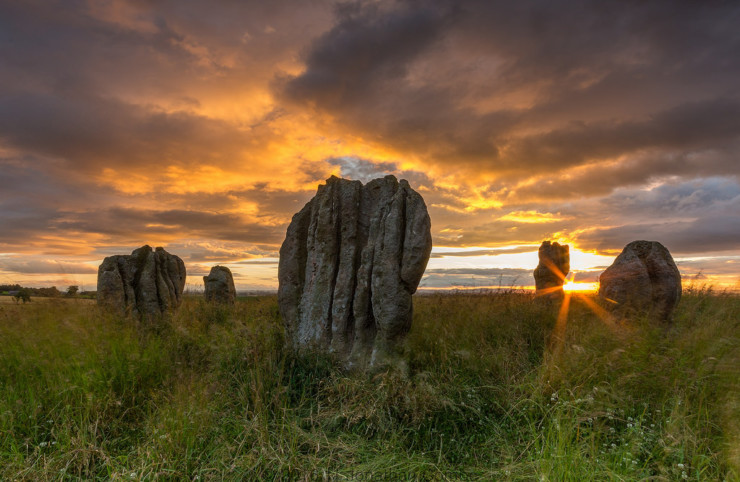Tweetspeak Poetry’s party on Twitter on Jan. 15 used prompts from Braiding Sweetgrass: Indigenous Wisdom, Scientific Knowledge and the Teaching of Plants by botanist and Native American Robin Wall Kimmerer. As might be expected, the prompts contained numerous references to nature—to trees, plants, flowers, and fruits.
The lines on Twitter don’t flow chronologically, because people see a prompt, consider a response, and then tweet the line or lines they’ve created. Some people tweet quickly; others take their time. The result is a series of tweets like overlapping arcs. When you look at the entire list, it appears formidable: How do you fashion poems from what looks like a disjointed incoherence?
The first step is to read the tweets several times, and you read from the bottom up, because that’s how they were tweeted. You gradually see the connections. You discover that the lines are really not disjointed or incoherent. You begin to see patterns and even themes.
The idea of “Skywoman,” for example, appeared early in the prompts and was soon left behind, but what struck me was how the idea permeated the entire exercise. Part of what I had to do was to bring Skywoman explicitly into the entire series of poems as a unifying idea.
The second step is mechanical. Copying this particular poetry jam resulted in a 47-page list of tweets, including people’s names, times, and even the words you see on Twitter (Reply / Retweet/ Direct Message) with each tweet. What I find helpful is to delete all of that, leaving only the names and the lines. I keep the names as a guide to see where the participant went next in the series.
The third step is the hard part—the actual compiling of lines into poems. I do a rough “batching” of 20 to 30 lines, and then begin to fit them together. I try to keep the lines as “original” as I can, but slight editing is often required. I’ve done this compilation exercise many, many times now, and I’m always surprised at how such diverse responses actually meld closely together.
Here are the final five poems.
Skywoman Braids Sweetgrass
By @llbarkat, @Doallas, @pathoftreasure, @lauralynn_brown, @BethanyR_, @LW_Wllingham, @SoniaJoie, and @SandraHeskaKing. Edited by @gyoung9751.
Skywoman walks among the trees
She knows the voice, the sounds of being.
It wants to be found. She knows
the sounds of black ash mingling with red maples,
elms speaking with willows.
The elms whisper, “Willow, I hear.”

the weeping that tastes of ash
from fires long gone cold.
She hears fire from the ash
and weeping from the willow,
a silvery song on the still-bare branches.
When a willow turns red, it is time
to peel the bark away; the willow
unravels in the fire, and fire, too,
whispers, “I hear, I hear.”
When a willow turns red, it is time
to shed what autumn foretells.
How the elms whisper, “Willow,
I hear you sigh, come near,
‘ere the fire seizes your hem.”
She seeks gratitude among elms,
to rest her head on their strength.
She turns and turns and turns,
her braided song unraveling and
turning to ash.
Not the voice, not the voice.
When shall I hear? Day’s end
bequeaths no sound,
nor night the sweetness of breath.
Shall I go on searching?
Under a blushing sky and fiery moon,
she finds refuge in songs of night.
Does the sky look down to earth
for answers, and search our lights
like stars?
Skywoman, the trees, and fire
What the fire hears, red, willow and aster:
Fire, too, whispers, “I hear, I hear,”
and all the woods shiver, ravel,
unravel. A few survive.
Skywoman considers: Being, unbeing,
to the place where the day begins.
The voice is heard, over hands,
over asters, wanting or not wanting.
She longs to hear the whispers of fire,
what the willow hears: the foretelling,
how the mother, braiding sweetgrass,
hand over hand, weaves her story
day into night, the sound of silver bells,
silvery trill on the still-bare branches
shivers the air, draws her to the place
where the day begins, settles in her mind.
She asks if gratitude, too, a citizen,
and braids gratitude in the hem of her skirt.
Gratitude becomes a story of wanting,
a wanting of story, and she feels the whispers
like sugar and bells. She braids sweetgrass
around her heart, soothed by songs.
Wanting the woods, she follows the sound
of searching, hand over hand.
Skywoman, hemmed and lost

Robin Wall Kimmerer
Sitting in a circle, she feels the silvery trill
of gratitude. Humming silver songs,
she hears the silvery chill. Sitting still
is an easy place to lose her way.
Sitting, hemmed among the sweetgrass,
she fears this. She longs to find her way.
Skywoman whispers,
then sings a song of fire:
I hear an easy place,
through the willows
and the pines.
Lose your way with me,
into the elms.
Hear how they whisper
their song that lights
upon your own lips.
Let me settle you.
Hear it in whispers.
Whispers, hearing.
It’s settled.
What is this place?
Take me.
Skywoman fears finding the songs
and losing the stories.
Four hundred years later,
voices set the page ablaze,
but the story doesn’t shiver.
Long is the page of her searching.
Skywoman the Wise
And four hundred years later, she is
Skywoman the Wise, settling disagreements
left to simmer too long. “Come,”
she calls them, promising secrets.
“Come braid with me. We lost this story
in the goldenrod, and found a new one
in the trees. The sweetgrass holds
our song at some boundary, invisible.
We find the braid, we braid the search,
We melt our way back home, strong
as the north. Yes, let us come.”
They melt their way back home,
to the north of cold and nights long
and days ill-spent, crossing a boundary
invisible, untraceable, so crossable
that it is an easy place to lose
their way. Skywoman tells them:
“Listen for songs braided under elms
and willows. They lead us to secrets,
to gold.”
Skywoman’s gift
When is it easy? Skywoman asks.
The answer lies in the space
between whispers. Always the space,
always the whispers, there will always
be more, clear to understanding.
The trees: Invisible pecans, braiding
the night. More nights, more north
and always the shells of the pecan keepers
that yield no secrets. She speaks: Let us
cross in the rain, trace the invisible.
Come, dear one, and braid the night.
I bring the gift, the gift of returning.
Braiding the night, I find you
under the willows, between the whispers
of elm and pecan trees. where words ripen
like strawberries. Cross in the rain
that binds you to earth, and settle me,
mettle me, sweet grass, unpetal me,
We trace the invisible north, in shells,
in braids, in being.
I give you the gift of weeping, the gift
of returning, to make fair each day
of your absence. The gift is the guide.
Let us braid the rain, this gift of weeping,
and we will sing of braided sweetgrass.
Related:
Tweetspeak Poetry Party, Part 1: Skywoman Braids Sweetgrass
Photo by Jonathan Coombes, Creative Commons, via Flickr. Post by Glynn Young, author of Poetry at Work and the novels Dancing Priest, A Light Shining, Dancing King, and the newly published Dancing Prophet.
__________________________

“I require all our incoming poetry students—in the MFA I direct—to buy and read this book.”
—Jeanetta Calhoun Mish
- Poets and Poems: Beth Copeland and “I Ask the Mountain to Heal My Heart” - July 10, 2025
- A.E. Stallings: the Parthenon Marbles, Poets, and Artists - July 8, 2025
- Poets and Fables: Steven Flint and “The Sun and the Boy” - July 3, 2025

L.L. Barkat says
So beautiful. Like little mythic songs.
(Thank you, again, for braiding, Glynn. 🙂 )
Glynn says
To every thing, braid, braid, braid,
there is a season, braid, braid, braid,
and a time
for every braiding
under heaven
Sandra L King says
It’s so fun to see you back in action, Glynn. Also, I love your description about how you braid. It’s a lot of work even for a legendary guy.
Glynn says
I’d rather be legendary than luminous. Or breathtaking. Although I wouldn’t mind being occasionally lyrical.
Bethany R. says
What gorgeous poems, Glynn. Thank you for sharing your process.
lynn says
Wow, each tweeted poem is unique…and lyrical! I don’t twitter but I enjoyed these.